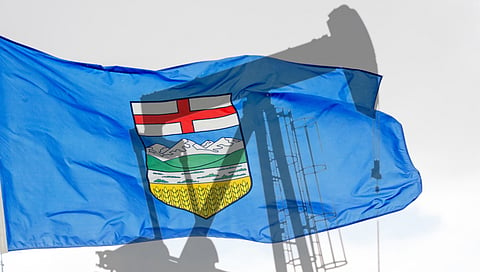

Despite assertions from Alberta Premier Danielle Smith that an upcoming report into orphaned and abandoned oil and gas wells represents an opportunity to apply new thinking to old problems, a leaked copy of the document obtained by The Western Standard suggests otherwise.
In fact, there is very little in the 71-page document to suggest that taxpayers won’t be on the hook for all or part of an estimated $30 billion worth of unpaid abandonment liabilities. Just don’t call them taxpayer dollars. Unless you don’t consider royalty credits, tax breaks and downward property reassements in rural municipalities to be public funds.
Among what are sure to be its most contentious suggetions, the report recommends establishing ‘special-purpose companies’ to acquire mature wells, produce the remaining oil and gas and use the revenue to fund cleanup. It also suggests using taxpayer dollars to backstop an insurance fund financed by the industry but guaranteed by taxpayers.
Smith herself courted controversy during the UCP leadership run by proposing to use royalty credits as incentives to encourage companies to clean up abandoned wells they are already required to do by law.
Both industry groups and rural municipalities are already complaining that Smith’s blue ribbon panel report will please nobody — and upset nearly everybody — when it is finally released on April 3 after nearly three years of deliberations.
Industry complains it is paying too much tax and royaties on what are already depreciated assets with little value. Shutting in some 245,000 marginal oil and gas wells will contribute to an already bulging inventory of derelict wells and decimate the rural economy that relies on oil and gas for whatever taxes they ultimately raise.
Raising taxes will ultimately diminish the value of those already marginal assets even further, they argue. And cracking down on companies by seizing their assets will only lead to more bankruptcies and even more wells that need to be magaged directly or indirectly by the government — despite the fact industry is already legally obliged to pay for it.
Meanwile, reeves and county councillors are worried they’re are going to be forced to cut taxes and subsidize an industry that already damages their roads to a disproportionate degree compared to what they actually pay — assuming they do pay taxes.
The RMA estimates its member rural municipalities are owed $254 million in unpaid taxes from 200 insolvent energy companies.
Cypress County alone has 28,422 marginal, inactive or decommissioned wells; the County of Newell has 21,796.
Cypress Reeve Dan Hamilton said in an interview that there’s a sense that oil compaies don’t pay enough in proportion to their use of country roads and facilities, although he agreed that unpaid back taxes by a few laggards “are a bigger problem.”
“And so you’ll see the report on April 3, and it’s a whole menu of different proposals that come from the rural associations, landowner groups, and various others,” Smith told Alberta’s Rural Municipalites Association on Monday.
But industry leaders who didn’t want to be quoted by The Western Standard said it just kicks the can down the road with comittees and subcomittees of subcommittes. One executive walked out of one of the sessions after taking three hours to agree on the definition of an “asset.”
Smith’s proposal to set up Crown corporations to manage so-called ‘mature’ assets is also sure to ruffle a few sacred cows on the altar of taking government out of the business of being in business.
David Yager, a former energy executive who serves as special energy adviser to Smith, steered the report process through five months of meetings with various industry stakeholders, various government ministries and agencies and rural municipalities.
In an interview, Yager declined to confirm any of the recommendations in the leaked draft on the grounds that it’s just that — a draft. He also agreed that no single party is likely to come away completely happy with the outcome.
No, he doesn’t think oil companies are paying too much in royalties on depleted — ‘mature’ — oil and gas wells. And yes, municipalities are going to have to come up with a compromise on tax assements to keep the industry viable in their communities.
He said it comes down to a distinction between ‘big oil’ and ‘little oil’ and whether they should be treated equally. He argues they shouldn’t.
The biggest talking point in any discussion of ‘mature’ assets is that the price of natural gas has dropped 90% in less than 10 years. “Nobody in the conventional media talks about that,” he said.
One of the purposes of the discussions was to come up with an ‘agreed’ set of facts that could be used to inform future policy discussions, he said. Apparently it was a tall glass of water to swallow.
“When somebody says, ‘look at all these wells and look at all these unpaid taxes. Look at how much money the industry is making’. Yeah. Well, it's more complicated than that,” he said.
“The premier definitely wants to have a look at this. It's long overdue.”
